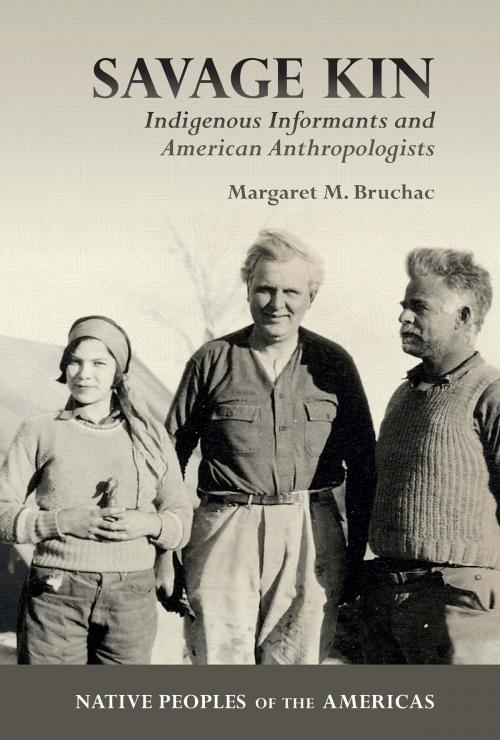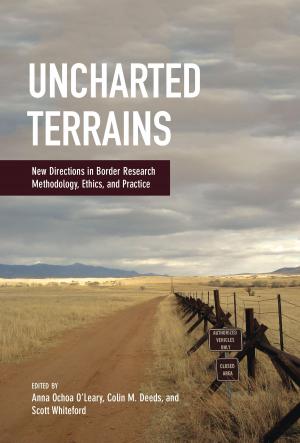Savage Kin
Indigenous Informants and American Anthropologists
Biography & Memoir, Reference, Nonfiction, Social & Cultural Studies, Social Science, Anthropology| Author: | Margaret M. Bruchac | ISBN: | 9780816538300 |
| Publisher: | University of Arizona Press | Publication: | April 10, 2018 |
| Imprint: | University of Arizona Press | Language: | English |
| Author: | Margaret M. Bruchac |
| ISBN: | 9780816538300 |
| Publisher: | University of Arizona Press |
| Publication: | April 10, 2018 |
| Imprint: | University of Arizona Press |
| Language: | English |
In this provocative new book, Margaret M. Bruchac, an Indigenous anthropologist, turns the word savage on its head. Savage Kin explores the nature of the relationships between Indigenous informants, such as Gladys Tantaquidgeon (Mohegan), Jesse Cornplanter (Seneca), and George Hunt (Tlingit), and early twentieth-century anthropological collectors, such as Frank Speck, Arthur C. Parker, William N. Fenton, and Franz Boas.
This book reconceptualizes the intimate details of encounters with Native interlocutors who by turns inspired, facilitated, and resisted the anthropological enterprise. Like other texts focused on this era, Savage Kin features some of the elite white men credited with salvaging material that might otherwise have been lost. Unlike other texts, this book highlights the intellectual contributions and cultural strategies of unsung Indigenous informants without whom this research could never have taken place.
These bicultural partnerships transgressed social divides and blurred the roles of anthropologist/informant, relative/stranger, and collector/collected. Yet these stories were obscured by collecting practices that separated people from objects, objects from communities, and communities from stories. Bruchac’s decolonizing efforts include “reverse ethnography”—painstakingly tracking seemingly unidentifiable objects, misconstrued social relations, unpublished correspondence, and unattributed field notes—to recover this evidence. Those early encounters generated foundational knowledges that still affect Indigenous communities today.
Savage Kin also contains unexpected narratives of human and other-than-human encounters—brilliant discoveries, lessons from ancestral spirits, prophetic warnings, powerful gifts, and personal tragedies—that will move Native and non-Native readers alike.
In this provocative new book, Margaret M. Bruchac, an Indigenous anthropologist, turns the word savage on its head. Savage Kin explores the nature of the relationships between Indigenous informants, such as Gladys Tantaquidgeon (Mohegan), Jesse Cornplanter (Seneca), and George Hunt (Tlingit), and early twentieth-century anthropological collectors, such as Frank Speck, Arthur C. Parker, William N. Fenton, and Franz Boas.
This book reconceptualizes the intimate details of encounters with Native interlocutors who by turns inspired, facilitated, and resisted the anthropological enterprise. Like other texts focused on this era, Savage Kin features some of the elite white men credited with salvaging material that might otherwise have been lost. Unlike other texts, this book highlights the intellectual contributions and cultural strategies of unsung Indigenous informants without whom this research could never have taken place.
These bicultural partnerships transgressed social divides and blurred the roles of anthropologist/informant, relative/stranger, and collector/collected. Yet these stories were obscured by collecting practices that separated people from objects, objects from communities, and communities from stories. Bruchac’s decolonizing efforts include “reverse ethnography”—painstakingly tracking seemingly unidentifiable objects, misconstrued social relations, unpublished correspondence, and unattributed field notes—to recover this evidence. Those early encounters generated foundational knowledges that still affect Indigenous communities today.
Savage Kin also contains unexpected narratives of human and other-than-human encounters—brilliant discoveries, lessons from ancestral spirits, prophetic warnings, powerful gifts, and personal tragedies—that will move Native and non-Native readers alike.















